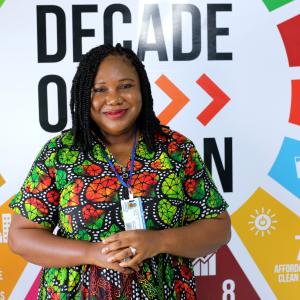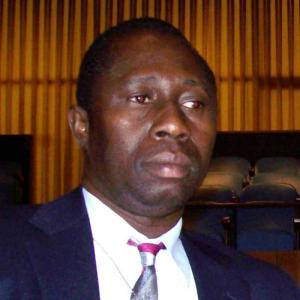Growing up, Ms. Smith aspired to be a bank teller. Seeing bank tellers serving her every time she went to the bank to pay school fees made her aspire to become like one of them. Her mind was set on becoming a bank teller such that when she was in the 11th grade and was asked to join her schoolmates for a career guidance fair, she felt there was no need to attend the session because she already knew the career path she wanted to follow.
“I told our instructor I already know what I want to do. I will just go and listen, but I am not changing my mind,” she said.
During the career guidance fair, a female ICT facilitator explained that, “as an ICT Specialist, you could do graphic design, do video editing, be a hardware technician, and be a system or network administrator. She told us that the ICT field is so vast, and you can work in any sector, including the bank, hospital, NGO, government, or church. That caught my attention. I immediately changed my mind and decided to pursue ICT,” explained Ms. Smith.
After high school, she enrolled in a Bachelor of ICT degree program at the Starz College of Science and Technology in Monrovia, becoming one of five women in a class of more than 40 men. Ms. Smith put a lot of effort into her studies, and in 2017, she graduated and attained the highest marks in her class.
Before joining the UN in Liberia, Ms. Smith worked for other organisations where she faced some challenges due to resistance mainly from colleagues who doubted her capabilities.
“Some people were not accepting me as an ICT Assistant. They felt that a woman could not provide better ICT services than a man.”
Ms. Smith recalled an incident when she was asked to fix a network problem at one office and a colleague did not allow her to touch a computer device despite assurances that she could fix the problem. Rather, the colleague questioned why she had been sent to fix the problem.
From her experience, Ms. Smith learnt that women working in technical fields need to continue improving themselves and proving that they are competent and can perform the same way or even better than men. “One way to build people’s confidence is to solve their problems. If someone’s printer is not working and you fix the problem, it helps to build trust,” she says.
Ms. Smith has not encountered any problem working with men because her counterparts accept her easily and they treat her like an equal. Her wish is to see more women join technical fields like ICT.
“I feel so happy when I see female electricians, but I don’t feel happy, when I go somewhere, and I am the only female ICT technician or when I go for a job interview, and I am the only female.
“I have started to encourage young women in my community and at church to join ICT and technology fields. If women are involved in innovations and technology, the approach will be different because they are always willing to do more,” she says.
Ms. Smith believes women and girls should use technology because it is an eye-opener. “Technology can change anyone’s life. If a person does not know anything about technology, they are limited. Technology opens your eyes, and you learn new things. You get new ideas and even meet new people without meeting them in person,” says Ms. Smith.
Her ambition is to be part of the team that will craft Liberia’s cyber law. Currently, there is no cyber law in Liberia. She also wishes to meet the woman who facilitated the career guidance session on ICT so that she can tell her that she changed her life.
As we celebrate the women’s month under the global theme, “DigitAll: Innovation and technology for gender equality” and national theme, “Innovating with technology to promote gender equality,” we celebrate women like Ms. Smith who have ventured into male dominated fields and are using technology to promote gender equality. We call on all stakeholders to invest in digital technologies and empower women.
UN Women is the United Nations entity dedicated to gender equality and the empowerment of women. A global champion for women and girls, UN Women was established to accelerate progress on meeting their needs worldwide. The entity works to position gender equality as fundamental to the Sustainable Development Goals, and a more inclusive world.
This story is part of a series from the UNCG in Liberia in commemoration of IWD and Women's Month.



